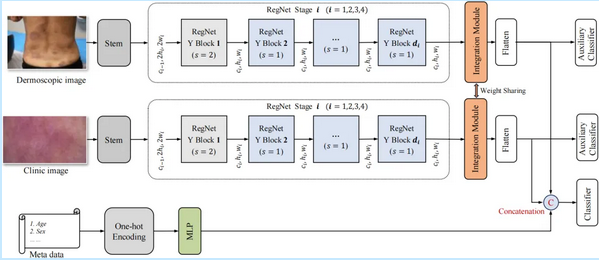Recently, a team led by Dr. Liu Jie, Chief Physician in the Department of Dermatology at PUMCH, in collaboration with Professor Xie Fengying's team from Beihang University, has developed the world's first multimodal artificial intelligence (AI)-assisted diagnostic system for early mycosis fungoides. The groundbreaking breakthrough provides a powerful tool for addressing this clinical challenge. It has been published in the prestigious international dermatology journal British Journal of Dermatology. The study was supported by the National Natural Science Foundation of China, the National High Level Hospital Clinical Research Funding, and the Beijing Natural Science Foundation, among others.
Mycosis fungoides (MF) is the most common type of cutaneous T-cell lymphoma. Its early manifestations closely resemble common skin conditions such as eczema and psoriasis, which leads to a misdiagnosis rate exceeding 30%. Traditional diagnosis relies on invasive skin biopsies and typically takes 2-3 years to confirm; as a result, patients often miss the crucial early treatment window. Achieving early, non-invasive, and accurate diagnosis has long been a challenge for dermatologists and patients alike.
The research teams from the Department of Dermatology of PUMCH and Beihang University combined three modes of information—patient demographics (age and gender, etc.), clinical images, and dermoscopic images—to train their AI model. This model functions like an experienced "AI dermatologist", capable of digging into multimodal data and accurately identifying early MF lesions that pass for ordinary skin conditions.

▲A multimodal fusion framework for MF diagnosis based on RegNetY-400MF
The research results demonstrate that the AI system achieved an independent diagnostic accuracy of 82.20%, significantly higher than the average performance of dermatologists for this condition (71.52%). Furthermore, human-AI collaboration proved highly effective: when doctors used AI results to inform their diagnoses, their sensitivity for early MF screening dramatically improved from 67.08% to 93.48%, and their specificity in accurately excluding non-MF cases also increased to 96.45%. AI assistance was particularly beneficial for junior physicians, improving their diagnostic accuracy by an average of 14.48%, effectively bridging their experience gap with more senior physicians. In addition, the system provides visual basis for its diagnostic decisions, enhancing transparency and credibility.
This AI system holds significant promise for patients, driving the transition from invasive to non-invasive diagnosis. More suspected MF patients may be spared from painful skin biopsy procedures, avoiding unnecessary discomfort and risk exposure. AI assistance can also substantially shorten diagnosis time, helping patients seize the critical early treatment window and ultimately improve treatment outcomes. Furthermore, AI tools can improve diagnostic accuracy across all healthcare tiers, especially empowering primary care physicians with limited experience and expanding access to quality diagnosis.
The multimodal AI system developed by the teams represents a promising application of AI in dermatological diagnosis and treatment. It not only enhances physicians' ability to diagnose early cutaneous lymphoma but also opens up new avenues for non-invasive diagnosis of early MF. It holds the potential to significantly improve patient care experience and prognosis.
Dr. Liu Zhaorui from PUMCH and Dr. Zhang Yilan from Beihang University are co-first authors of this paper.
Pictures courtesy of the Department of Dermatology
Edited by Wang Jingxia
